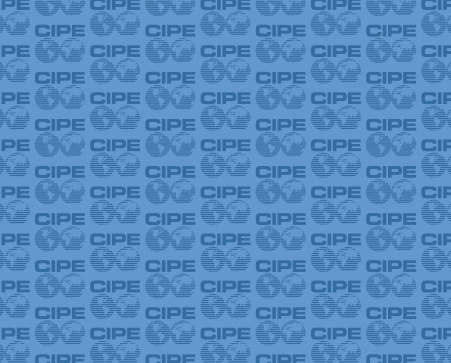
Moving from a dictatorship to a democracy was not easy for the Philippines. It was a long and painful process due to corruption, doubt, financial issues, distrust of the government, and the absence of rule of law.
More than two decades after the “People Power” movement ousted the Marcos dictatorship in 1986, the Philippines continues to make progress. In the latest Corruption Perceptions Index report for 2012, the country moved up 24 points (to 105th out of 176) from its rank in 2011 (129th out of 183) — a tremendous leap compared to rank improvements in previous years.
CIPE recently had the honor to invite Dr. Jesus Estanislao to speak about economic reform during the Philippines’ transition to democracy. With his professional background and personal experience helping to guide the transition, Dr. Estanislao offers a unique perspective on economic reform and institution building in the Philippines.
Dr. Estanislao’s entire career has been dedicated to democratic and economic reforms in the Philippines. He was the 4th Socio-economic Planning Secretary and concurrent Director-General of the National Economic and Development Authority from 1989-1990. He also served during the Aquino administration as the Secretary of Finance of the Philippines from 1990-1992. In his current role as the Chairman of both the Institute of Corporate Directors (ICD) and the Institute for Solidarity in Asia (ISA), Dr. Estanislao leads two groups of experts focusing on corporate governance and public governance work in the Philippines.
In his speech, Dr. Estanislao explained how the Philippines made this remarkable achievement, what challenges occurred during the transition to democracy, and how the Philippines overcame these obstacles. “People did not believe in democracy,” Dr. Estanislao said.
The [Aquino] administration inherited bankrupt financial institutions…there were too many regulations that caused confusion…the press did not know their boundary and how to behave when they became free…and the widespread distrust of the government, both domestically and internationally, became a stumbling block to the Philippines’ transformation.
Despite these challenges, the Aquino administration was determined to rebuild the Philippines and to provide opportunities for its citizens to improve their quality of life. Major steps forward included rehabilitating the banking institutions, simplifying rules and regulations to reduce opportunities for corruption and make it easier to start and expand businesses, opening up the economy to trade and investment, establishing owner registration for land reform, and extending government support for basic education through the high school level.
Furthermore, the Philippines embarked on writing a new constitution to strengthen the rule of law in 1987. The new constitution, written by an independent body and approved by public vote, re-established the Supreme Court as an independent branch to separate powers within the government, and imposed free elections down to the smallest political unit.
The meaningful improvements described above helped the Philippines gradually transform into a true democracy where hopes and opportunities were no longer impossible for ordinary citizens. Nevertheless, Dr. Estanislao humbly pointed out that there remain many areas for improvement within the Philippines’ civil society, which requires a “culture change” to address the fundamental issues and sustain the country’s democratic development for the long haul.
Striving for this culture change, the two institutions led by Dr. Estanislao, ISA and ICD, are dedicated to advocating improved public and corporate governance in the Philippines. CIPE has worked with both institutions on initiatives that yielded significant results in recent years
ISA’s Performance Governance System (PGS), which aims to improve government performance, has been adopted by a fast-growing network of central government agencies in the Philippines. In late September 2012, Mayor Jose Garcia from the city of Balanga, from which the PGS was adopted, received the Lingkod Bayan Award from President Aquino for outstanding achievements in public governance. Mayor Garcia expressed his gratitude to ISA and stated that the PGS makes the city “more transparent in the provision of public services.”
At the September 26, 2012 Public Governance Forum, Guillermo Luz, Chairman of the Philippine National Competitiveness Council, commented: “what does the PGS mean for the average Filipino citizen? Two words: savings and quality. For example, progressing through the PGS has improved the ability of government agencies to deliver high quality public works on time and on budget.”
Five years ago, ICD also entered a partnership with CIPE to focus on improving corporate governance by using the Corporate Governance Scorecard (CGS) — a system that rates companies’ corporate governance practices and ranks these companies on an index. Fast forward to today: evidence in the 2012 scorecard results indicate continued progress, with 39 companies scoring 90% or higher, compared to 36 companies in 2011 and 30 companies in 2010. Furthermore, the percentage of companies that received scores lower than 50% continues to drop. A leading component that stimulates the Philippines’ economic growth is the remarkable improvements of corporate governance in the banking industry — banks in recent times have received their best credit ratings in the Philippines’ history.
Looking back on its 25-year journey of reform, the Philippines demonstrates the determination and capabilities needed to undergo a major shift from dictatorship to democracy. Obstacles to reform were largely derived from the deep-rooted cultural influences embedded in corrupt and weak institutions.
These obstacles were not overcome immediately. But through the hard work of adopting a new constitution, separating powers within the government, rebuilding society, and implementing rule of law within the public sector, the Philippines endowed its people with greater freedom and democracy. To sustain these gains, as Dr. Estanislao stresses, the Philippines must continue to strengthen its democratic development via responsible citizenship and better governance within government agencies and corporations.
Michelle Chen is Program Assistant for Asia at CIPE.
Published Date: December 19, 2012